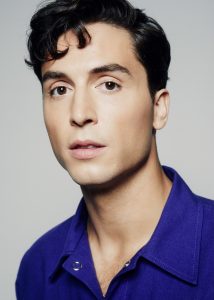Benito Skinner on “Overcompensating,” Coming Out, and Creating Comedy with Heart

Coming of age is hard enough. Coming out is a whole other story and social media star Benito Skinner tells his with honesty and humor in his queer comedy series Overcompensating.
Equal parts raunchy and heartwarming comedy, the show centers around lead character Benny (played by Skinner) as he starts college, intent on keeping up the façade he perfected in high school as the straight jock who “loves p***y”. That is until he meets Carmen (Wally Baram), another freshman facing her own issues of self-worth and identity. The two forge a connection that, while rocky, allows each of them to feel safe enough to be who they truly are.
Well-known in the TikTok and Instagram worlds with a large and dedicated following, Skinner found much to love about his entry into screenwriting and first television series to foster gay representation. We spoke about the experience and about finding joy and humor in some of life’s most challenging moments.
Check out our Benito Skinner interview:
Tell me your story. How closely does it resemble what we see onscreen in the series?
I did grow up in Idaho… I played football… I needed to be valedictorian, because I thought there was something very wrong with me. There was a little secret I was hiding. Then I went to Georgetown, where, initially, I was going to be in the Business School. I did drop out, and I went into English and Film and Media Studies. And I met a few women, but one in particular who really changed my life. I feel like it was in our relationship that I was able to practice being myself for the first time… and I think you see that in the show. So that aspect really parallels my own life.
There were other things that became a part of this coming out/coming of age series. The things you desire and the things you want… and who you want to project to the world. All of those things not aligning in the right way and the messiness of it. But this bond between a gay man and a woman that I feel is a part of so many of our stories is at the core of my life in the show.
What opportunities did social media offer you as you were growing up?
At first they offered me a platform to lie! When I was in college, it was about “how thick can I make my neck?” I did what I saw other people doing. Straight guys all had these blurry photos of themselves on a football field, and I thought “I can mock that one.”
But once I came out, I think it’s the only place where I felt like I could be in control while also exploring who I am and the person that I had restricted and repressed for so long. I also had no access point into this industry and didn’t know anyone who was in it. I came from Idaho! So I didn’t grow up hearing about it or knowing how any of it works.

Benito Skinner. Photo by Erik Tanner
It feels strange that we discredit things that are free and accessible and allow people to showcase their work and have their voices heard. I fortunately join a long line of people that have done that and have made great works of art. I saw it as the only way that I could get into this seat where I’m at right now, just making my own show and acting and creating. The internet has offered me a lot of critiques on how dry my skin is or what my body looks like. But it’s also offered me an unbelievable outlet and a community of people who have responded to my comedy. And a lot of access to my heroes. I think sometimes the DMs are the first place where you get to have a talk with someone. As toxic as social media can be, it can also be a really beautiful place for artists.
How did your work on those platforms prepare you for a career in screenwriting?
I was very visual and wrote all of my sketches for years, just hammering down one joke, and that’s what some of the scenes in the show feel like. You know who the characters are very quickly and you know what’s going on with them. You almost know more about them than we’ve told you within a few seconds. That’s what I wanted, and that’s what the internet allowed me to do, just because you don’t have time. I have to hook you in 5 seconds. The costume, the setting, the writing… if it’s not completely engaging, I’ll lose you. I took that with me to this, and once I was here, I allowed myself to take a breath. Time was a gift, but also a scary thing to think about. “Now how do I make it 30 pages?” That was a challenge. But once you bring in collaborators in a writers’ room, then it’s just so juicy. You have all these people who can help you. Now I get to turn to someone and ask “Is this funny?” Whereas before it was “I think this is funny” and the internet would quickly tell me if it wasn’t.
What was your biggest challenge in moving to a TV show?
I think the main adjustment – and it maybe was not so much a challenge as it was different – was working with notes and with more than just myself or one friend. I had these characters in my head for the past five years, so it was a new experience to run a writers’ room and allow these brilliant people that were in there to free me from what I thought the show had to be. I had to give up a little control and let myself be surprised. That can make you nervous and you think “that’s not what I planned,” But I think it made me realize that that was the joy of this – it wasn’t just mine. I wanted to do this with people who are my heroes and my peers and the people who really inspire me.
Tell me about Benny and Carmen’s relationship. The show contains a lot of sexual humor, but it’s this platonic friendship that is at the center of the series. How did you want to portray them together?
I wanted to show that the relationship between gay men and women is way more than just slapstick. These relationships have saved my life and saved so many gay people’s lives. We don’t seek other gay people – we’re too scared, because “a gay person will reveal that I’m gay.” Women have created these safe spaces for queer people for so long. And so, for me, I just wanted people to feel what I and so many other queer people have felt the first time you meet a woman like that – a woman who has been ignored, but who is so special. I also wanted to show how messy it is, and how there can be so much collateral damage with coming of age, and especially with coming out of the closet. There are lies told for the sake of self-preservation. I think that these relationships are really complicated and require a lot of communication and honesty. They’re a place of safety, but also a rich place to find story. I know that my experience with women in college was laced with guilt and joy and sadness and confusion. I feel really fortunate that all of that is in the show. We didn’t shy away from the messiness of coming into yourself, or the beauty of the end of the night in a dorm room or a Domino’s parking lot with this person with whom you can let out a sigh of relief.
Tell me about balancing that depth with the “bro” humor of the series.
It was about trying to be as real to the locker rooms as I felt like we could go – it’s so big, and I remember it being even bigger at times. I once watched these two guys talk about height and sex, and they tried to one up each other for hours. I thought “They must be exhausted”. It is performative.
There’s this belief that coming out now is not as big of a deal. I wanted to address that in the show to say “To you, maybe!” But look at the world that so many queer people occupy. I haven’t been in a locker room in a while, but I don’t know if it’s changed that much. It seems like with what’s going on in the world, it hasn’t. So in our show, we look at why Benny wouldn’t come out. Why does Grace feel like she needs to be with this guy? Why is Carmen looking to some of these men for validation? We live in a world where masculinity is the North Star. So to finally be able to make such a joke out of it is so fun and was so delicious for me, my showrunner and the writers’ room. There’s catharsis in that.
But I also think that they’re a part of this too, and that while they might have created it, they’re also punished by it. That’s what Peter’s character is about. I don’t think he’s a bad guy. This is just what they’re taught at their all-boys school. Good luck, you know?
Every episode title is also a song title. Tell me about your use of music in the show.
I wanted to create a nostalgic fever dream of the 2010s. We didn’t want to be too specific because I think, at a certain point, you don’t have the budget. But I feel like music was the access point and that was so inspiring for me. I’m already starting to think of Season 2, if we get it, and I listen to playlists all day from that time. They just bring me back immediately. Charli (XCX), of course, was so sonically impactful when I was in college. And she is now. So that, to me, felt like this tie of both the past and the present.
Everyone has stories with these songs. Everyone has a “Lucky” story and a “Welcome to the Black Parade” story. Music is something I always write in a script. Having Nicole Weisberg and Jen Malone as our music supervisors and Charli as the producer on it meant we could pepper in the things that I couldn’t even totally communicate myself. I find that part to be just pure bliss and we are so lucky that we got the music we did.
We often see cameos in comedies and there are a lot of fun celebrity appearances in your show! What, in your opinion, can cameos add to a comedic screenplay?
The guest star and what they bring to it immediately gives the audience all the feelings that we want you to feel. There’s such a wink to culture and to this world that we’re having fun within. Megan Fox…I think that’s something where we read it on the page and everyone thought “She’s not going to do it, this is crazy”. And then we wrote a letter and she responded to the comedy. I felt so lucky that she did, because something like that just brings you into the world, in the same way the music does.
I think what they bring into it is history. That is what cameos have done so beautifully in so many other shows for so long. 30 Rock always did that really well. They’d bring in someone, and it would be unexpected. That’s what we were thinking too. You get this legend like Andrea Martin – you can already feel the prestige there and know you’re about to start laughing. That’s what an icon can do.
Join the Discussion!
Related Articles
Browse our Videos for Sale
[woocommerce_products_carousel_all_in_one template="compact.css" all_items="88" show_only="id" products="" ordering="random" categories="115" tags="" show_title="false" show_description="false" allow_shortcodes="false" show_price="false" show_category="false" show_tags="false" show_add_to_cart_button="false" show_more_button="false" show_more_items_button="false" show_featured_image="true" image_source="thumbnail" image_height="100" image_width="100" items_to_show_mobiles="3" items_to_show_tablets="6" items_to_show="6" slide_by="1" margin="0" loop="true" stop_on_hover="true" auto_play="true" auto_play_timeout="1200" auto_play_speed="1600" nav="false" nav_speed="800" dots="false" dots_speed="800" lazy_load="false" mouse_drag="true" mouse_wheel="true" touch_drag="true" easing="linear" auto_height="true"]










You must be logged in to post a comment Login